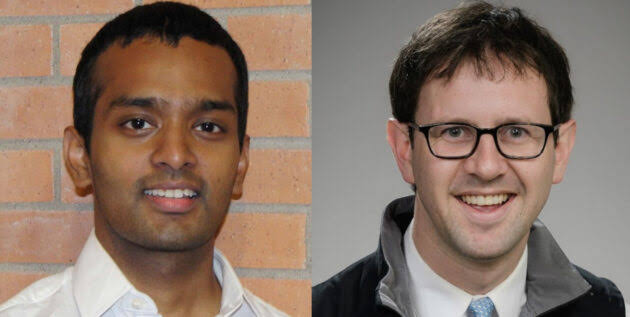Google’s got a thing for Seattle health tech startups.
The tech giant acquired Sound Life Sciences, a small University of Washington spinout that developed an app to monitor breathing.
A Google spokesperson confirmed the purchase of the company on Tuesday. Google did not provide additional information about the transaction, including when it occurred and an acquisition price.
Shyam Gollakota, the startup’s CEO and a UW computer science and engineering professor, declined to provide details when contacted by GeekWire.
Gollakota founded the company in 2018 with Jacob Sunshine, a UW Medicine associate professor of anesthesiology and pain medicine.
Sound Life Sciences’ app monitored breathing using sonar technology to detect movement. The app had the potential to ease the diagnosis of sleep apnea, which traditionally involves an overnight stay at a sleep disorder center. It could also enable people with conditions such as asthma or congestive heart failure to keep track of their respiratory rate.
The company employed five people as of December. The startup also received clearance that month from the U.S. Food and Drug Administration to market the app, opening the door to reimbursement from insurance companies.
Following the FDA announcement, the company stopped posting on its LinkedIn and Twitter accounts. Its website is no longer active.

In 2017 Google acquired another UW spinout, Senosis Health, founded by UW computer scientist Shwetak Patel and four clinicians.
Senosis similarly developed apps to monitor health, including hemoglobin levels and bone strength. Senosis also developed an app to measure breathing by holding a phone at arm’s length and blowing on it.
It’s unclear how Google is using Sound Life Sciences’ technology, but the tech giant and its parent Alphabet have invested in health technology for several years.
Alphabet subsidiary Verily Life Sciences uses connected devices for patient care and remote clinical trials, such as a watchto collect heart rate and other data.
Verily also has a joint venture with digital health company ResMed focused on sleep apnea. The venture, called Primasun, aims to develop digital tools to help identify, diagnose, treat, and manage the condition and other sleep disorders.
Primasun offers virtual visits with sleep specialists and provides testing “from the comfort of your own bed” using “FDA-approved at-home sleep testing.” The venture also offers personalized coaching and monitoring.
Verily recently raised $1 billion in venture capital funding, led by Alphabet, which dissolved its umbrella program Google Health into multiple teams last year.
Google also doubled down on digital health last year when it scooped up fitness wearables company Fitbit for $2.1 billion.
The Senosis deal came with a non-exclusive license, enabling other companies interested in the technology to license it as well. In 2019 Patel said he was working with Google on healthcare following the acquisition.
Sunshine told GeekWire in December that the company’s sleep app was just the beginning. “This is basically that first clearance from which we’ll build more exciting use cases,” he said at the time. He envisioned applications such as infant monitoring and cardiac arrest identification.
The company was a finalist for Health Innovation of the Year at the GeekWire Awards in 2020.
Sound Life Sciences was powered with funding from the National Institutes of Health and the Biomedical Advanced Research and Development Authority totaling more than $2.5 million.
Nicholas Mark, a physician with Swedish, lists himself on LinkedIn as a founder of the company but left in 2020.
Google’s other acquisition of a Seattle startup came in 2020 when it bought development company AppSheet.




